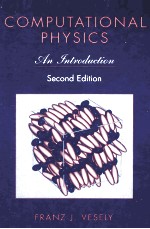图书介绍
COMPUTATIONAL PHYSICS AN INTRODUCTION SECOND EDITION2025|PDF|Epub|mobi|kindle电子书版本百度云盘下载

- 著
- 出版社: KLUWER ACADEMIC;PLENUM PUBLISHERS NEW YORK
- ISBN:0306466317
- 出版时间:2001
- 标注页数:259页
- 文件大小:76MB
- 文件页数:274页
- 主题词:
PDF下载
下载说明
COMPUTATIONAL PHYSICS AN INTRODUCTION SECOND EDITIONPDF格式电子书版下载
下载的文件为RAR压缩包。需要使用解压软件进行解压得到PDF格式图书。建议使用BT下载工具Free Download Manager进行下载,简称FDM(免费,没有广告,支持多平台)。本站资源全部打包为BT种子。所以需要使用专业的BT下载软件进行下载。如BitComet qBittorrent uTorrent等BT下载工具。迅雷目前由于本站不是热门资源。不推荐使用!后期资源热门了。安装了迅雷也可以迅雷进行下载!
(文件页数 要大于 标注页数,上中下等多册电子书除外)
注意:本站所有压缩包均有解压码: 点击下载压缩包解压工具
图书目录
Ⅰ The Three Pillars of Computational Physics1
1 Finite Differences7
1.1 Interpolation Formulae9
1.1.1 NGF Interpolation9
1.1.2 NGB Interpolation10
1.1.3 ST Interpolation11
1.2 Difference Quotients12
1.2.1 DNGF Formulae12
1.2.2 DNGB Formulae14
1.2.3 DST Formulae15
1.3 Finite Differences in Two Dimensions17
1.4 Sample Applications18
1.4.1 Classical Point Mechanics18
1.4.2 Diffusion and Thermal Conduction19
2 Linear Algebra21
2.1 Exact Methods22
2.1.1 Gauss Elimination and Back Substitution22
2.1.2 Simplifying Matrices: The Householder Transformation25
2.1.3 LU Decomposition26
2.1.4 Tridiagonal Matrices: Recursion Method29
2.2 Iterative Methods31
2.2.1 Jacobi Relaxation32
2.2.2 Gauss-Seidel Relaxation (GSR)34
2.2.3 Successive Over-Relaxation (SOR)34
2.2.4 Alternating Direction Implicit Method (ADI)36
2.2.5 Conjugate Gradient Method (CG)36
2.3 Eigenvalues and Eigenvectors40
2.3.1 Largest Eigenvalue and Related Eigenvector40
2.3.2 Arbitrary Eigenvalue/-vector: Inverse Iteration42
2.4 Sample Applications43
2.4.1 Diffusion and Thermal Conduction43
2.4.2 Potential Equation44
2.4.3 Electronic Orbitals45
3 Stochastics47
3.1 Equidistributed Random Variates49
3.1.1 Linear Congruential Generators49
3.1.2 Shift Register Generators50
3.2 Other Distributions53
3.2.1 Fundamentals53
3.2.2 Transformation Method56
3.2.3 Generalized Transformation Method:57
3.2.4 Rejection Method59
3.2.5 Multivariate Gaussian Distribution62
3.2.6 Equidistribution in Orientation Space66
3.3 Random Sequences68
3.3.1 Fundamentals68
3.3.2 Markov Processes71
3.3.3 Autoregressive Processes74
3.3.4 Wiener-Levy Process77
3.3.5 Markov Chains and the Monte Carlo method78
3.4 Stochastic Optimization80
3.4.1 Simulated Annealing81
3.4.2 Genetic Algorithms82
Ⅱ Everything Flows85
4 Ordinary Differential Equations89
4.1 Initial Value Problems of First Order90
4.1.1 Euler-Cauchy Algorithm90
4.1.2 Stability and Accuracy of Difference Schemes91
4.1.3 Explicit Methods94
4.1.4 Implicit Methods96
4.1.5 Predictor-Corrector Method98
4.1.6 Runge-Kutta Method101
4.1.7 Extrapolation Method104
4.2 Initial Value Problems of Second Order105
4.2.1 Verlet Method105
4.2.2 Predictor-Corrector Method108
4.2.3 Nordsieck Formulation of the PC Method110
4.2.4 Runge-Kutta Method112
4.2.5 Symplectic Algorithms112
4.2.6 Numerov’s Method117
4.3 Boundary Value Problems119
4.3.1 Shooting Method120
4.3.2 Relaxation Method121
5 Partial Differential Equations125
5.1 Initial Value Problems I (Hyperbolic)129
5.1.1 FTCS Scheme; Stability Analysis129
5.1.2 Lax Scheme131
5.1.3 Leapfrog Scheme (LF)133
5.1.4 Lax-Wendroff Scheme (LW)135
5.1.5 Lax and Lax-Wendroff in Two Dimensions135
5.2 Initial Value Problems 11 (Parabolic)138
5.2.1 FTCS Scheme138
5.2.2 Implicit Scheme of First Order140
5.2.3 Crank-Nicholson Scheme (CN)141
5.2.4 Dufort-Frankel Scheme (DF)143
5.3 Boundary Value Problems: Elliptic DE143
5.3.1 Relaxation and Multigrid Techniques147
5.3.2 ADI Method for the Potential Equation148
5.3.3 Fourier Transform Method (FT)150
5.3.4 Cyclic Reduction (CR)153
Ⅲ Anchors Aweigh157
6 Simulation and Statistical Mechanics161
6.1 Model Systems of Statistical Mechanics164
6.1.1 A Nutshellfull of Fluids and Solids164
6.1.2 Tricks of the Trade168
6.2 Monte Carlo Method171
6.3 Molecular Dynamics Simulation175
6.3.1 Hard Spheres175
6.3.2 Continuous Potentials177
6.3.3 Beyond Basic Molecular Dynamics178
6.4 Evaluation of Simulation Experiments181
6.4.1 Pair Correlation Function182
6.4.2 Autocorrelation Functions184
6.5 Particles and Fields185
6.5.1 Ewald summation186
6.5.2 Particle-Mesh Methods (PM and P3M):188
6.6 Stochastic Dynamics191
7 Quantum Mechanical Simulation195
7.1 Diffusion Monte Carlo (DMC)196
7.2 Path Integral Monte Carlo (PIMC)201
7.3 Wave Packet Dynamics (WPD)209
7.4 Density Functional Molecular Dynamics(DFMD)211
8 Hydrodynamics215
8.1 Compressible Flow without Viscosity216
8.1.1 Explicit Eulerian Methods217
8.1.2 Particle-in-Cell Method (PIC)218
8.1.3 Smoothed Particle Hydrodynamics (SPH)220
8.2 Incompressible Flow with Viscosity226
8.2.1 Vorticity Method227
8.2.2 Pressure Method229
8.2.3 Free Surfaces: Marker-and-Cell Method (MAC)231
8.3 Lattice Gas Models for Hydrodynamics232
8.3.1 Lattice Gas Cellular Automata232
8.3.2 The Lattice Boltzmann Method236
8.4 Direct Simulation Monte Carlo / Bird method237
Appendixes239
A Machine Errors241
B Discrete Fourier Transformation245
B.1 Fundamentals245
B.2 Fast Fourier Transform (FFT)246
Bibliography249
Index257
热门推荐
- 1609398.html
- 2239827.html
- 3767842.html
- 458517.html
- 972287.html
- 2791237.html
- 545563.html
- 2858186.html
- 2884282.html
- 317462.html
- http://www.ickdjs.cc/book_3162172.html
- http://www.ickdjs.cc/book_1617312.html
- http://www.ickdjs.cc/book_3202665.html
- http://www.ickdjs.cc/book_351802.html
- http://www.ickdjs.cc/book_324051.html
- http://www.ickdjs.cc/book_3662044.html
- http://www.ickdjs.cc/book_1569602.html
- http://www.ickdjs.cc/book_909670.html
- http://www.ickdjs.cc/book_2519881.html
- http://www.ickdjs.cc/book_3785281.html